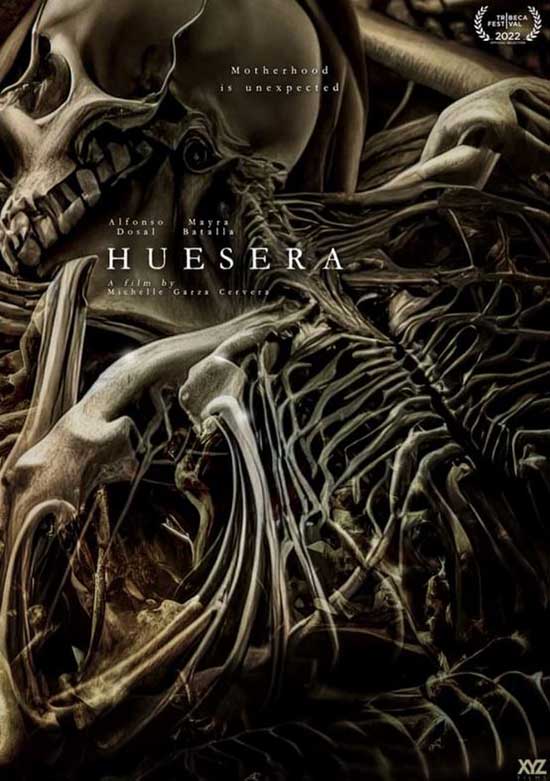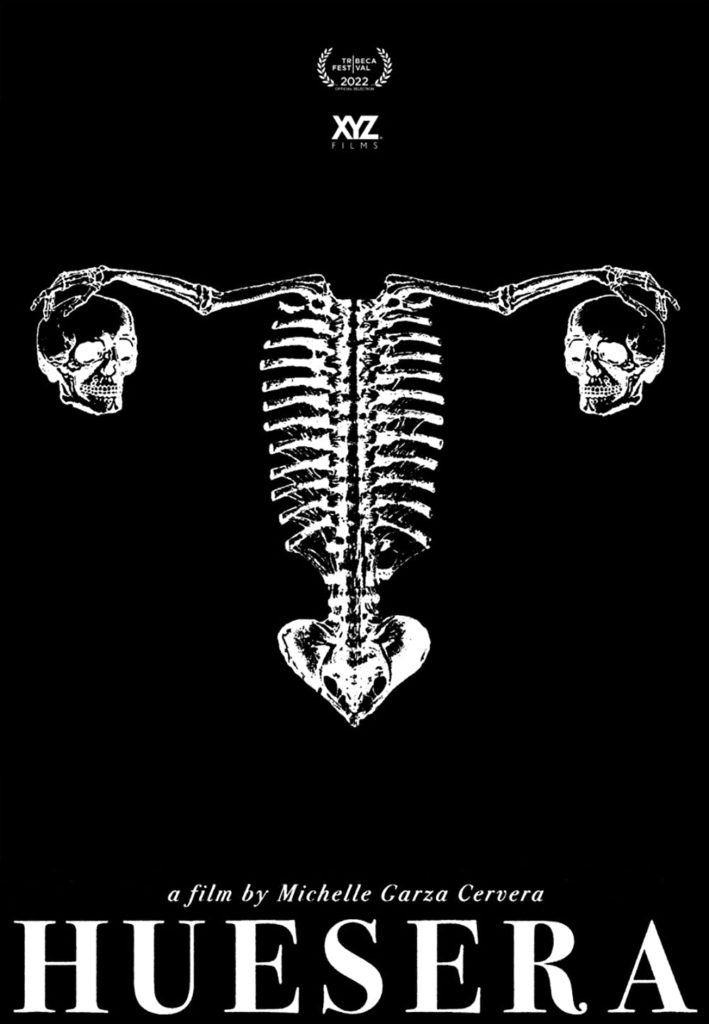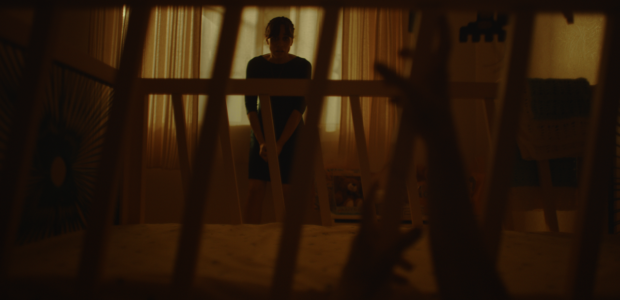It’s said that the best art straddles the line between personal and political. Bold and cathartic, liberating and provocative. In 2022, look no further than Michelle Garza Cervera’s HUESERA.
Created in cooperation between Peru and Mexico, HUESERA tackles a subject taboo in much of Latino culture, and horrifyingly close to the chest in far too much of the United States as of this writing: what happens when a woman born into a mandated birth culture doesn’t want a child? What if she doesn’t ever want the traditional heterosexual family life she’s been told she should want her entire life?
These are the questions that haunt Valeria (Natalia Solián) in a role she herself described as “therapeutic and liberating” when she spoke about it after its premiere at Fantastic Fest.

HUESERA follows married couple Valeria and Raúl (Alfonso Dosal), who have newly become pregnant. While initially overjoyed at this new development in her life, Valeria soon becomes haunted almost every waking moment by a horrific manifestation of her own hesitancy and fear that her life and very sense of self are being broken and torn apart. As Valeria rapidly unravels and her infant is placed in mortal peril, she’s beset on all sides by family and former friends needling her about her future, her past self, and her darkest secrets.
It’s a frustrating truth to say that films about motherhood that show anything but the brightest, saccharine positivity are booted to the wayside, if they’re made at all, even in 2022, but it is a truth. Globally, if you’re a woman who has no children, or vocally has no desire to ever have children, you’re looked upon as defective at best and monstrous at worst. Huesera chooses neither viewpoint, instead focusing on the complex web of emotions at the heart of every woman living within these strict expectations levied upon them by society. Did Valeria choose to have a straight relationship and leave her girlfriend because she wanted to or because she felt she couldn’t be queer? Did she really want to be married? Did she even want to be a mother? What forces around her made her feel like she had no real choice in any or all of these matters? And most importantly, how does she feel herself as she goes through these changes and interrogations?
The result is a tour de force between Natalia Solián’s performance, the film’s sound design and choreography, and the small coterie of women surrounding Valeria.
The choreographed physicality of the Huesera spirit appears in a grotesque, creaking ballet of cracking bones and torn muscles; the literal image of Valeria’s torn sense of identity matching the constant cracking of her shoulder and knuckle joints as she becomes more unhinged. The use of dancers and contortionists as a substitute for any visual effects of the spirit or creature is a gamble, but it pays off in spades with its impact. The sorrowful and painful dances inspire empathy more than terror and allow for a more robust exploration of her mental and emotional torment.

In the human realm, we have the three potential paths of Valeria’s future: her former lover and friend Octavia (Mayra Batalla), Her mother-of-two-tiny-terrors sister Vero (Sonia Couoh), and her single, childless aunt Ursula (Martha Claudia Moreno). Swirling around her like a hurricane, the women in turn tempt and repulse her, pulling her twisting bones in seemingly every direction possible. Almost like a coven of witches, they’re integral in giving Valeria mirrors to bounce potential reflections off of, even if they’re not images of her she’s proud to resemble. Even more importantly, we do get glimpses of their own idiosyncrasies and regrets in their interactions with her, making even her emotionally frigid and abusive sister have a shocking amount of depth.
For her part, Solián injects so much complexity into what could easily run the risk of being an unlikeable, one-dimensional character. In less capable hands, Valeria could be relegated to the exact kind of character her family members see her as: hypocritical, fake, selfish, and damaged. Instead, we see a woman who has these faults, as any human does, but who herself struggles with finding her place in the world and allowing herself to feel the happiness and freedom she so deeply feels she shouldn’t have. It’s a holistic look at those who regret their moments of conformity, their choice to settle down, and their shame at feeling anything but complete joy at the thought of giving birth, even when they actively tried to become pregnant because it’s just “what you do” when you settle down in life. We know people in our lives like her, some of us may even be her, or have been raised by her. It’s such a sorely needed portrayal, and the catharsis it gave Solián radiates like a comforting halo from the screen.
And it’s a halo of warmth that women everywhere deserve to see and to have. In a world where a woman’s right to choose for herself seems increasingly under fire, where it almost seems compulsory to fall in line into a marriage, parenthood, social banality, and the dull day-to-day thorns of life, HUESERA gives dignity to the women who don’t. Dignity to the women who forge their own path towards whatever happiness they choose. Dignity to the women who leave.
Tags: Adriana Martínez, Aida López, Alfonso Dosal, Cabeza De Vaca, Fantastic Fest 2022, Gibrán Androide, Horror, Martha Claudia Moreno, Mayra Batalla, Mercedes Hernandez, Mexico, Natalia Solian, Nur Rubio Sherwell, Peru, Sonia Couoh, XYZ Films



No Comments